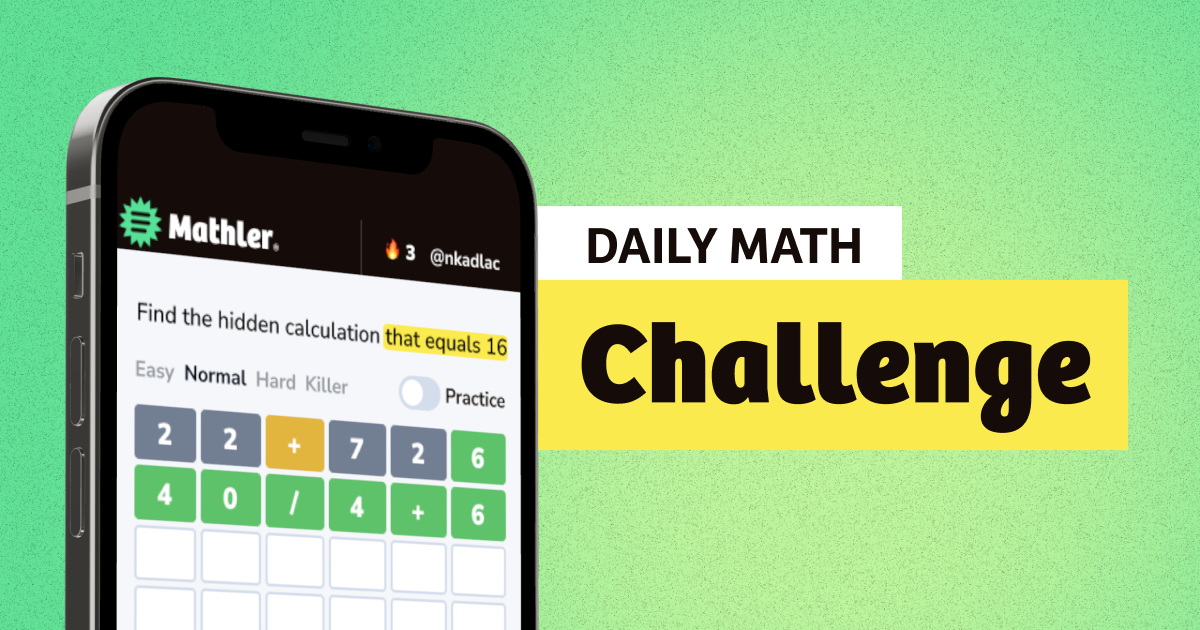Be Smarter With a Daily Math Challenge

How can someone make themselves smarter without going through the long, arduous path of academics? Is there any other way to learn and polish your knowledge in a convenient way?
There is.
What if we told you that gamified mathematics is the solution you're looking for?
With the rising popularity of daily puzzles and brain-boosting games, even well-known skill-building apps like Duolingo and Mondly have turned studying into a more accessible and convenient way to improve oneself.
And with games like Mathler, Sumplete, Nerdle and more, you can enhance your existing skills by just playing daily for five minutes!
What is a daily math challenge?

It's exactly as it sounds—you challenge yourself with a gamified math puzzle to improve your brain. After all, for someone to improve, they must face an adequate level of challenge. Too easy, and it'd be boring without any stakes. Too hard, and you'll fail without even learning anything.
By doing math puzzles every day and continuous exposure to arithmetic and number theory, you can easily get over the current problem of finding a fun way to learn and improve!
How solving hidden calculations and number theory games helps you

Books are a great learning resource for academics. The problem is, the most in-depth ones tend to be really boring. But with math games? You can address boredom and mental stagnation at the same time!
Sharpens your mental agility
Short puzzles train your brain to think faster, spot patterns and juggle numbers better. Think of it as a brisk jog, but for your mind.
Boosts focus & discipline
Tackling one challenge a day builds consistency. It's not too much for anyone to add to their daily routine, which helps build discipline.
Stress relief in disguise
These daily challenges are math games. As in, they're made to have fun! That little “aha!” moment when you answer the right solution or number? That's an instant dose of dopamine to boost your mood.
Gamified learning has better retention
Web games keep math entertaining, so you actually want to practice on your own volition. The repetition sneaks in mastery without the grind.
Community & competition
When you play daily math challenges and games, especially if you post them on social media, people are bound to notice and interact with you. Then you'd end up sharing streaks, comparing scores, or challenging friends. Nothing more stimulating than a little competition, after all!
Confidence booster
Each solved puzzle is proof that you tried and overcame a challenge. That confidence spills over into work, study and everyday problem‑solving.
More on the benefits of playing math puzzles →
Common types of daily math challenges you can answer

Daily math challenges don't come from just one source—there are many kinds you can choose from and tackle at your leisure.
Here are some of the most common types of daily math games that you may have already seen:
- Equation/expression-building math games (e.g. Mathler, Nerdle)
- Arithmetic-centric challenges (e.g. MathHeads, 24 Game)
- Grid-type puzzles (e.g. Sumplete, KenKen)
They come in many different formats and focus on varying mechanics, but they're all effective in providing the mental challenge you need!
Who daily math challenges are great for
- Adults wanting brain training
- Students needing warm-ups
- Teachers looking for bell-ringers
- Older adults maintaining cognitive sharpness
How to start your own daily math routine
To kick off your daily math challenge training, here are some of the things to consider:
✅ It should be short, preferably doable in the morning or during a break
✅ It should be adequately challenging
✅ It should be accessible
✅ It should be a daily game/puzzle or have an unlimited mode
With that in mind, here are some basic steps you can follow in creating your own daily math challenge:
For those who prefer quick wins...
- Morning: One quick round of Easy Mathler or Sumplete
- Midday: One breaktime round of a logic puzzle like Sumplete or KenKen on easy difficulties
- Evening: One round of any math game you prefer while laying down to sleep, on easy difficulty as well
For those who are actively trying to improve their skills...
- Morning: Two rounds of Normal/Classic Mathler or Nerdle
- Midday: Normal/Classic difficulty, one logic puzzle like Sumplete or Kakuro and one equation/expression building math game
- Evening: Three rounds of your preferred math game at Normal/Classic difficulty
For those who are aiming to top the leaderboards...
- Morning: Two rounds of Hard Mathler
- Midday: Hard difficulty, two logic puzzles
- Evening: Five rounds of your preferred math game at Hard or Killer difficulty
Remember, you don't need to win them all. You're aiming for improvement via consistency, so don't be afraid of failure!
Best games/puzzles for daily math challenges
| Game | Difficulty | Puzzle Type |
|---|---|---|
| Mathler | Easy–Hard | Math Expression Game (build equations using PEMDAS) |
| Nerdle | Moderate | Math Equation Solver (guess the full calculation) |
| Sumplete | Medium | Grid Logic Puzzle (remove numbers to match row/column sums) |
| Kakuro Conquest | Medium–Hard | Math Crossword Puzzle (fill digits to match sum clues) |
| Sudoku Conquest | Easy–Hard | Number Logic Puzzle (complete rows/columns with 1–9) |
| Hitori Conquest | Hard | Logic Grid Puzzle (remove duplicates while keeping connectivity) |
Bringing daily math challenges to students
If you're an educator or simply want to bring math games into a classroom setting, here are several tips we have for you!
Project the puzzle or share the screen for the class
This is an excellent opening exercise for primary and secondary school students, particularly those in the most critical developmental years (8+ years old).
Use the games/puzzles as extra credit
Another way to implement these math challenges naturally is to provide them as an optional activity that students can play and complete for extra credit. This not only gives them an incentive to play, but also allows them to sharpen their skills in a fun way.
Classroom competition
Is the class falling into routine? Then use the games/puzzle for a surprise competitive activity with credit as a reward.
Use printed puzzles
Some of these games offer printed versions of their puzzles. Mathler, for example, has a free e-book for download.
Tips for staying consistent
Set a fixed time
Treat it like brushing your teeth—same slot every day (morning coffee, lunch break or pre‑bed wind‑down).
Start small, then scale up
If you're having a hard time doing puzzle sets, try committing to just one puzzle a day. Once it’s routinary for you, start adding more.
Track your streak
While most daily games have an internal stat-tracker, if the one you're playing doesn't have it, use a calendar, app or even a sticky note on your wall. Seeing the chain grow makes you not want to break it.
Gamify the routine
Reward yourself for milestones. Gone through a week without losing or even longer? Time to flex on social media or reward yourself with a nice treat!
Pair it with a habit
Do your games/puzzles with something you already do daily, like when sitting down on the toilet every morning, during break in the afternoon or on the bus or train ride back home in the evening.
Mix it up
Rotate between different games to keep it fresh. Doing the same thing every day, no matter how fun it is, leads to eventual burnout.
FAQ
What is the best daily math puzzle for adults?
Mathler is a well-rounded daily math puzzle ideal for young teens and adults. Nerdle also fits this description, but for those who prefer equations instead of expressions.
How many minutes of math puzzles per day improve brain function?
Based on research, a math puzzle playtime of around 15 minutes daily is great for improving the mind. Keep in mind, though, that this is 15 minutes spread around the whole day, and not just in one go.
How long should a daily math challenge take?
Three minutes at the shortest, ten at the longest. If a game/puzzle takes too long, lower the difficulty or swap it out for another entirely.
Are these challenges suitable for adults or students?
Both! Adults can use them for mental fitness, teachers can use them as warm-ups and students can use them to keep them on their feet. Though it's important to give your mind a different experience after a numerical challenge, and we recommend that you balance math with Queens logic puzzles afterward.
Do I need to be good at math?
Not at all. These puzzles focus on reasoning, not memorization. And most daily games are designed for the casual player, meant to be played by almost everyone.
Solved today's current problem? Then keep playing!
We hope that we were able to teach you the advantages of taking on a daily math challenge and the different ways you can make your own routine. If you're interested in playing more brain-boosting apps like these, check out our math Wordle and logic puzzle games and subscribe to our newsletter!